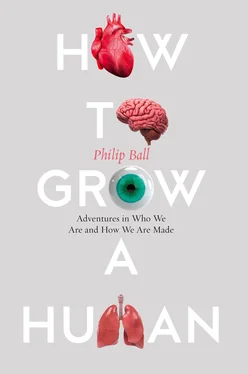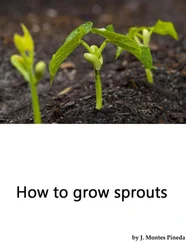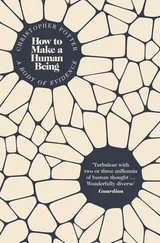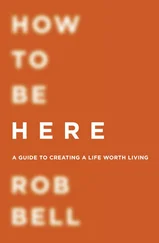1 ...7 8 9 11 12 13 ...20 Might we, then, call a genome not a blueprint but a recipe? The metaphor has rather more appeal, not least because many recipes assume implicit knowledge (especially in older cookbooks). But a recipe is still a list of ingredients plus instructions to assemble them. Genomes do not come with users’ instructions, more’s the pity. Harold offers a different image, allusive and poetic and all the more appealing for that:
I prefer to think of the genome as akin to Hermann Hesse’s Magister Ludi [aka The Glass Bead Game ]: master of an intricate game of cues and responses, in which he is fully enmeshed and absorbed; a game that is shaped as much by its own internal rules as by the will of that masterful player.
If there was better public communication of the complex, contingent and often opaque relationship of genotype to phenotype, there might be rather less anxiety about the idea that genes affect behaviour. Small variations in each individual’s genetic make-up can have an influence – sometimes a rather strong one – not just what you look like but what your behaviour and personality are like. This much is absolutely clear: there is not a single known aspect of human behaviour so far investigated that does not turn out to show some correlation with what gene variants we have. Even habits or experiences as apparently contingent and environmental as the amount we watch television 9or our chance of getting divorced are partly heritable, meaning that the differences between individuals can be partly traced to differences in their genes.
Far from alarming us, this shouldn’t surprise us. We have always been content to believe that, for example, some people seem blessed with talents that can’t obviously be explained by their environment and upbringing alone. By the same token, some seem hardwired to find particular tasks challenging, such as reading or spatial coordination.
Yet perhaps because we have a strong sense of personal agency, autonomy and free will, many people are disturbed by the idea that there are molecules in our cells that are pulling our strings. They needn’t worry. It is precisely because genetic propensities are filtered, interpreted and modified by the process of growing a human cell by cell that they don’t fully determine how our bodies turn out, let alone how our brains get wired … let alone how we actually behave.
Genes supply the raw material for developing our basic cognitive capabilities – to put it crudely, they are a key part of what allows most human embryos to grow into bodies that can see, hear, taste, that have minds and inclinations. But how they exert their effects is very, very complicated. In particular, very few genes affect one trait alone. Most genes have influences on many traits. Some traits, both behavioural and medical (such as susceptibility to heart disease), seem to be influenced – in ways that are imperceptible gene by gene, but detectable when their effects are added up – by most of the genome. That’s why the popular notion of a “gene for” some behavioural trait is misguided. In fact, it means that there may be no meaningful “causal” narrative that can take us from particular genes to behaviours.
* * *
This is precisely why we need to resist seductively simple metaphors in genetics: blueprints, selfish genes, “genes for”. Of course, science always needs to reduce complex ideas and processes to simpler narratives if it is going to communicate to a broader audience. But I’ve yet to see a metaphor in genomics that does not risk distorting or misrepresenting the truth, so far as we currently know it. Fortunately, I do not think this matters for talking about the roles of genes in making a human. We will deal with those roles as they arise, without resorting to any overarching story about what genes “do”.
I haven’t even told you yet the worst of it, though. It’s not simply difficult to articulate clearly what, in the scheme of growing humans the natural way, genes do. For we don’t exactly know how to define a gene at all.
This isn’t a failure of biology, but a strength. It’s tempting to imagine that science can’t be fully coherent if it can’t define its key terms. But the most fundamental concepts are in fact almost invariably a little hazy. Physicists can’t say too precisely or completely what time, space, mass and energy are. Biologists can’t say what a gene or a species is. For that matter, chemists aren’t fully agreed on what an element or a chemical bond is. In all cases, these terms arose because it seemed as though they had a very specific meaning, but when we looked more closely we found fuzzy edges. Yet the reason we coined the terms in the first place was because they were good for thinking with .
That remains true. A gene is a useful idea, perhaps in much the same way as words like “family” and “love” and “democracy” are useful: they are vessels for ideas that enable us to have useful conversations. They are usually precise enough .
Here, then, is a definition good enough to let us talk about genes in the role of growing a human from cells. Think of a gene as a piece of DNA from which a cell is able to make a particular molecule, or group of molecules, that it needs in order to function. By passing on copies of genes, cells can pass on that information so that the progeny doesn’t have to rediscover it from scratch.
If you raised your eyebrows at “so that”, good for you. In such phrases, biology is given a false purpose, an illusory sense that it pursues goals. It is nigh on impossible to talk about biology – about growth, development, evolution – without some mention of aims. Try to remember that this is always mere metaphor. The way that the laws of the physical world have played out on our planet is such that entities called cells have appeared that have a propensity to pass on genes to copies of themselves. This is remarkable and marvellous. No one really understands why it happens – why reproduction, inheritance and evolution is possible – and that’s why we find it necessary to tell stories about it. All we can say is that there is absolutely nothing that forces us to invoke any supernatural explanation for it. The gaps that remain would make an extremely peculiar shape into which such an account might be squeezed.
Here’s another thing worth knowing about genes: a gene on its own is useless . It can’t replicate, 10it can’t even do the job that evolution “appears” to have given it. Frankly, there is no real point in calling a gene on its own a “gene” at all: the name connotes an ability to (re)produce, but a lone “gene” is sterile, just a molecule that happens to resemble a part of the DNA in a chromosome. It’s common to say that a gene is a piece of DNA with a particular sequence, but the truth is that such a physical entity only becomes a gene in the context of a living system: a cell, at minimum. Genes are central ingredients of life, but by the time you reach the level of the gene there is nothing left that is meaningfully alive.
No, life starts with the cell. And that’s why a gene only has meaning by virtue of its situation in a cell. Does this, then, mean that the cell is more fundamental to biology than the gene? You might as well ask if words are more fundamental to literature than stories. It is “stories” that supply the context through which words acquire meaning, making them more than random sounds or marks on paper.
And by “context” here I don’t just mean that a gene has to be in a cell in order to represent any biologically meaningful information. I mean also that, for example, the history of the cell, and of the entire organism, might matter to the function a gene has. A gene that is “active” at one point in the organism’s growth might represent a quite different message – have a different implication – than at a later or earlier point. Yet the molecular machine (the protein) encoded by the gene may be identical in the two cases. The gene doesn’t change, but the “instruction” it represents does.
Читать дальше












